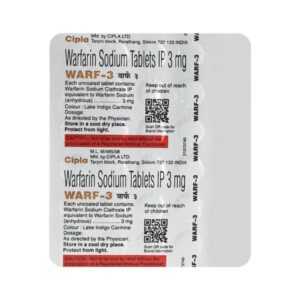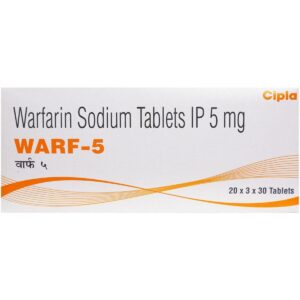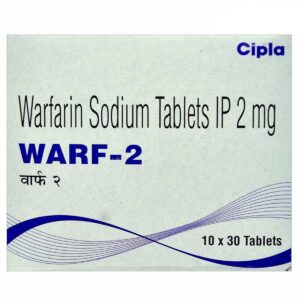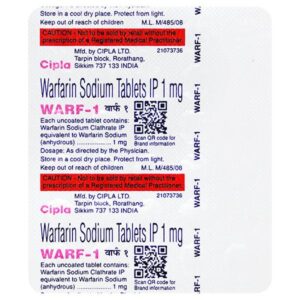WARFARIN
WARFARIN: Warfarin is an anticoagulant, commonly referred to as a blood thinner, that is used to prevent and treat blood clots. It is primarily prescribed to people at risk of forming blood clots and those with conditions such as deep vein thrombosis, atrial fibrillation, artificial heart valves, and pulmonary embolism.
The mechanism of action of warfarin involves inhibiting the synthesis of vitamin K-dependent clotting factors in the liver. It does this by blocking the action of an enzyme called vitamin K epoxide reductase. This ultimately prevents the normal clotting process by interfering with the formation of blood clots.
The dose of warfarin varies for each individual and is determined by a variety of factors including the patient’s specific condition, medical history, current medications, and response to treatment. It is usually taken orally, once daily, at the same time each day. The dosage is typically adjusted based on regular blood testing to evaluate the patient’s prothrombin time (PT) or international normalized ratio (INR).
Like any medication, warfarin has potential side effects. The most significant concern is the risk of bleeding, as it is an anticoagulant. Other common side effects include easy bruising, prolonged bleeding from cuts, gum or nosebleeds, and blood in urine or stools. In rare cases, warfarin can cause severe bleeding, either internally or externally, which may require prompt medical attention.
It is important to note that warfarin can interact with various medications, including prescription, over-the-counter drugs, and herbal remedies. These interactions can alter the effectiveness of warfarin or increase the risk of bleeding. Therefore, it is crucial for patients taking warfarin to inform their healthcare providers of all medications they are currently taking to avoid any potential complications.
Regular monitoring of the INR is necessary while on warfarin therapy to ensure that the dosage remains within a safe and effective range. Patients should also follow a consistent diet to avoid fluctuations in vitamin K intake, which can affect the medication’s effectiveness.
In summary, warfarin is an anticoagulant used to prevent and treat blood clots. It works by inhibiting the synthesis of clotting factors in the liver. The dosage varies for each individual and is adjusted based on regular blood tests. The main side effect is an increased risk of bleeding. Careful monitoring is required while on warfarin therapy, and patients should be cautious of potential drug interactions and maintain a consistent diet.




